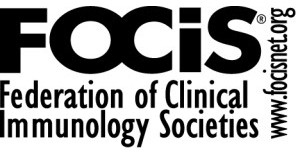IMII’s partnership with FOCIS will advance scientific development in clinical immunology leading to technologies such as the vaccine against RSV and cancer, as well as new methods for diagnosing prevalent diseases.

In recognition of excellence in translational scientific research conducted, the Millennium Institute of Immunology and Immunotherapy, IMII, was recently named a “Center of Scientific Excellence” by The Federation of Clinical Immunology Societies of the United States (FOCIS). In this way, the IMII is the first center in the Southern Cone to join this prestigious international network of centers of scientific and clinical excellence.
The UC Professor and Director of IMII, Dr. Alexis Kalergis, highlighted the relevance of being part of this network of scientific excellence whose emphasis, like his institute, is placed on translational research, that is, that which goes from the basic-fundamental to its application in patients. “Joining FOCIS places us in the ‘Champions League’ of world clinical immunology and for us it is a great honor, because it links us as members of the network with the best centers of excellence in this discipline on the planet. Therefore, we believe that this will enhance and position even better the progress we are making at IMII ”, commented Dr. Kalergis in the framework of the FOCIS annual meeting, held in Boston, USA.
RSV vaccine, cancer therapy and new diagnostic tools
One of the expectations of the scientist and academic from the Catholic University is that the participation of this network accelerates the path to international clinical trials of the vaccine against the syncytial virus, which already has the approval of Chilean authorities, to start the tests in humans. This phase is expected to develop in the coming months in our country, applying the vaccine to 24 healthy adult volunteers. “Being linked to other centers that have a lot of experience in clinical studies will allow us to have their knowledge for the clinical development of our vaccine, as well as other advances that we have made at the IMII”, comments the researcher.
The IMII Director also assured that thanks to this new alliance, “all our lines will benefit.” In this context, he announced that a promising area for development and collaboration is immunology and immunotherapy against cancer, which is led by Dr. Flavio Salazar, deputy director of IMII. “During the Centers of Excellence directors meeting, I was approached by the director of a German center, who expressed her interest in creating a formal collaboration in cancer research. This seems very relevant to us, as this is a very strong area at IMII, and we undoubtedly think it could be further enhanced in partnership with prestigious German scientists”, said Dr. Kalergis.
Additionally, belonging to this network of Scientific Centers will allow IMII to position internationally its research related to new and better diagnostic methods, which are being successfully developed under the auspices of the institute and other associated institutions. For example, new tools for the diagnosis and prognosis of infectious diseases are currently being validated in our country, the development of which will benefit from the wide network of clinical centers that are part of FOCIS.
Similar opinions are shared by Dr. Pablo González, associate researcher at IMII and professor at UC. “Belonging to FOCIS not only highlights the IMII as a Regional Center of Excellence, but also gives it access to tools to enhance biomedical research bringing it closer to the clinic.”
Regarding the annual meeting of FOCIS, the director of the Chilean center highlighted the importance of jointly analyzing the various global health problems related to immunology. “It was a very complete congress and with many conclusions. The most general and important is that much remains to be done in matters such as vaccines, infectious and inflammatory diseases, or the negative impact of obesity on the inflammatory response, among other issues